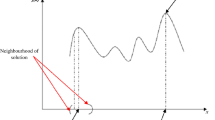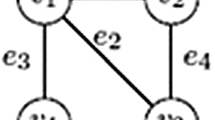Abstract
A new heuristic approach that resembles the evolution of interpersonal relationships in human society is put forward for the problem of scheduling multitasks represented by a directed acyclic graph. The algorithm includes dynamic-group, detachgraph and front-sink components. The priority rules used are new. Relationship number, potentiality, weight and merge degree are defined for cluster’s priority, and task potentiality for tasks’ priority. Experiments show the algorithm could get good result in short time. The algorithm produces another optimal solution for the classic MJD benchmark. Its average performance is better than five latter-day representative algorithms, especially six benchmarks of the nines.
Similar content being viewed by others
References
Mika M, Waligóra G, Weglarz J. A Meta Heuristic Approach to Scheduling Workflow Jobs on a Grid [C]// Grid Resource Management — State of the Art and Future Trends, Norwell, MA: Kluwer Academic Publishers, 2004: 316–339.
Maheswaran M, Ali S, Siegel H J, et al. Dynamic Matching and Scheduling of a Class of Independent Tasks onto Heterogeneous Computing Systems [C]// Proc 8th IEEE Heterogeneous Computing Workshop (HCW’99). Los Alamitos: IEEE Computer Society, 1999: 30–44.
Martino V D, Mililotti M. Sub Optimal Scheduling in a Grid Using Genetic Algorithms [J]. Parallel Computing, 2004, 30: 553–565.
Alhusaini A H, Prasanna V K, Raghavendra C S. A Unified Resource Scheduling Framework for Heterogeneous Computing Environments [C]// Proc 8th IEEE Heterogeneous Computing Workshop (HCW’99). Los Alamitos: IEEE Computer Society, 1999: 156–168.
Palis M A, Liou J C, Wei D S L. Task Clustering and Scheduling for Distributed Memory Parallel Architectures [J]. IEEE Trans Parallel and Distributed Systems, 1996, 7(1): 46–55.
Park C I, Choe T Y. An Optimal Scheduling Algorithm Based on Task Duplication [J]. IEEE Trans Computers, 2002, 51(4): 444–448.
Lee W, Howard J, Vwani P R, et al. Task Matching and Scheduling in Heterogeneous Computing Environments Using a Genetic-Algorithm-Based Approach [J]. Journal of Parallel and Distributed Computing, 1997, 47(1): 8–22.
Shroff P, Watson D W, Flann N S, et al. Genetic Simulated Annealing for Scheduling Data-Dependent Tasks in Heterogeneous Environment [C]// Proc 5th Heterogeneous Computing Workshop (HCW’ 96). Honolulu, Hawaii: IEEE Computer Society, 1996: 98–117.
He Kun, Zhao Yong. A Unified Model and Analyze for Resource Scheduling Problem in Grid Environments [J]. Journal of Huazhong University of Science and Technology (Nature Science Edition), 2006, 34(3): 35–39 (Ch).
Sarkar V. Partitioning and Scheduling Parallel Programs for Multiprocessors [M]. Cambridge, MA: MIT Press, 1989.
Yang T, Gerasoulis A. DSC: Scheduling Parallel Tasks on an Unbounded Number of Processors [J]. IEEE Trans Parallel and Distributed Systems, 1994, 5(9): 951–967.
Kim S J, Browne J C. A General Approach to Mapping of Parallel Computation upon Multiprocessor Architectures [C]// International Conference on Parallel Processing (ICPP’88), Pennsylvania: IEEE Computer Society, 1988: 1–8.
Wu M Y, Gajski D D. Hypertool: a Programming Aid for Message-Passing Systems [J]. IEEE Trans Parallel and Distributed Systems, 1990, 1(3): 330–343.
Baxter J, Patel J H. The LAST Algorithm: A Heuristic-Based Static Task Allocation Algorithm [C]// International Conference on Parallel Processing (ICPP’89), Pennsylvania: IEEE Computer Society, 1989: 217–222.
McCreary C, Gill H. Automatic Determination of Grain Size for Efficient Parallel Processing [J]. Comm of ACM, 1989, 32(9): 1073–1078.
Huang Wenqi, Jin Renchao. The Quasi-Physical Personification Algorithm for Solving SAT Problem-Solar[J]. Science in China (Series E). 1997, 27(2): 179–186(Ch).
McCreary C L, Khan A A, Thompson J J, et al. A Comparison of Heuristics for Scheduling DAGs on Multiprocessors [C]// Proc 8th Int Symposium on Parallel Processing, Washington, DC: IEEE Computer Society, 1994: 446–451.
Author information
Authors and Affiliations
Corresponding author
Additional information
Foundation item: Supported by the National Natural Science Foundation of China (7047107) and the Ph.D. Programs Foundation of Ministry of Education of China (20020487046)
Biography: HE Kun(1972-), female, Ph.D. candidate, research direction: the computer network and parallel computing.
Rights and permissions
About this article
Cite this article
He, K., Zhao, Y. Clustering and scheduling method based on task duplication. Wuhan Univ. J. of Nat. Sci. 12, 260–266 (2007). https://doi.org/10.1007/s11859-006-0028-y
Received:
Issue Date:
DOI: https://doi.org/10.1007/s11859-006-0028-y




